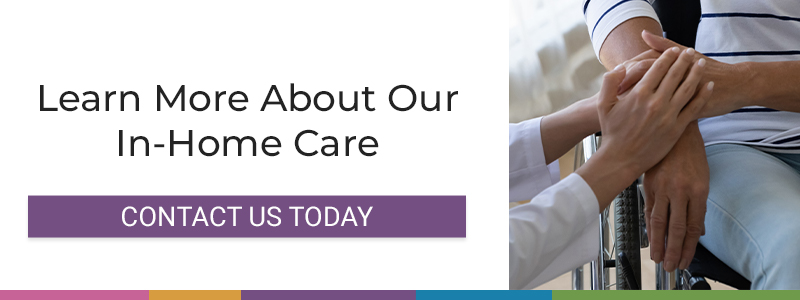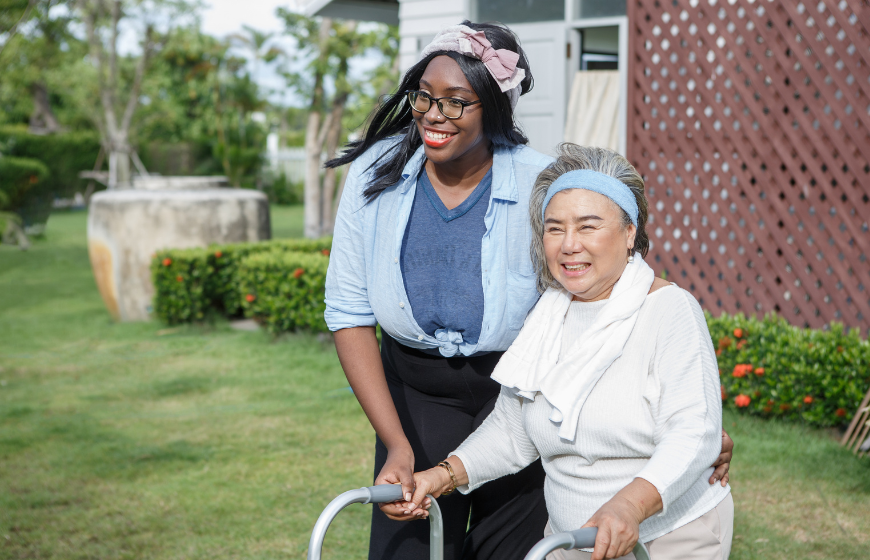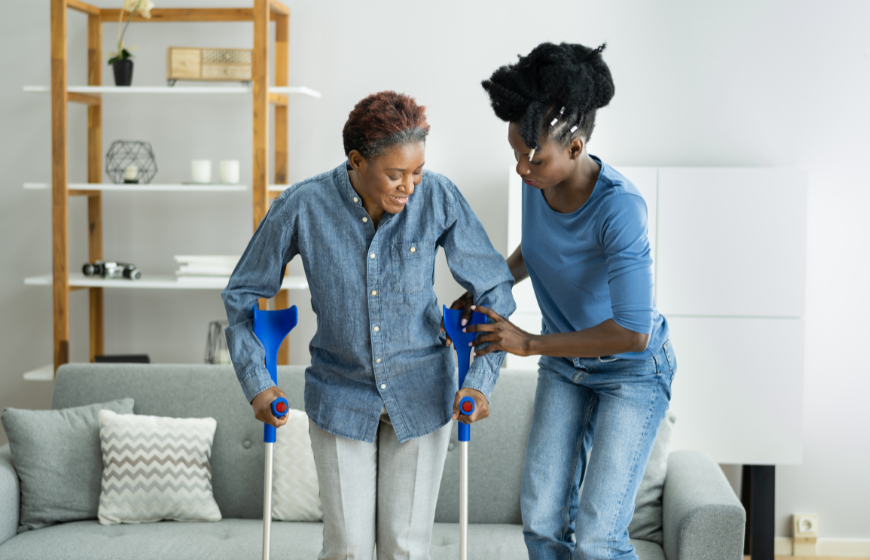Caring for elderly parents can be an emotionally taxing experience. It’s not easy watching your parents get older and depending on their health history, they may need more care than you’re able to give them on your own.
If there’s a significant geographic distance between you and your elderly parents, caring for them becomes even more complicated and presents its own unique set of challenges. Fortunately, caring for your parents from a distance isn’t impossible, and more importantly, you don’t have to do it alone.
If your parents are facing common old age diseases that require extra care, or you are just wondering if non-medical sensior care is a good option for your loved one, take a look below at our advice for how to help elderly parents from a distance.
Consider Relocation
Living far away from your parents can present a range of obstacles when it comes to managing all of their healthcare needs. When you live cities or states away, it simply isn’t possible to be there for every doctor’s appointment, specialist’s visit, or other procedures your parents might need.
For some people, closing that distance is the best option when it comes to caring for their elderly parent/s, moving to the same state, city, or even neighborhood as their parents.
For others, closing the distance can mean moving their elderly parents into their house. Cohabiting with your elderly parents can come with a number of benefits, including:
- Financial savings – Sharing a living space with your elderly parents can limit the amount of money they need to spend on things like groceries, housing, and utilities. You can even split expenses so that you can both reap the financial benefits.
- Added security – Many people appreciate the added sense of security gained by being able to keep a close eye on their elderly parents. When you share a home with them, you never have to worry about an accident going unnoticed or subpar elderly care in a nursing home or senior housing.
- Social perks – Loneliness among elderly people can present its own range of health risks, from increased risk of cognitive decline to a battery of mental health issues like anxiety and depression. By moving your parents in with you, you can help lessen these risks.1
Be Realistic
That said, uprooting your life or your parents’ life isn’t always the most suitable course of action. In fact, it may not even be possible, depending upon your situation. But that doesn’t mean you have to completely give up control of your parent’s health care.
When distance poses an issue, it’s important to be realistic—with yourself and with your parents—about how involved you can be in their health care. It likely won’t be possible for you to attend every check-up or accompany them for every medical procedure, so be practical about what you can do, manage your expectations for how much care you can provide remotely, and make a plan.
Consider At-Home Care
There are many ways to care for your elderly parents from afar. Knowing the different types of long term and short term senior care will help you plan for your parents’ future.
Depending on their needs, options for elderly parents might include:
- Assisted living facilities – Assisted living facilities allow elderly people a certain amount of independence while keeping health care nearby.
- Nursing homes – Nursing homes offer 24/7 care for elderly people who need to be monitored more closely or who need more regular care or assistance.
However, an at-home healthcare service or a home medical assistance provider, like Alliance HomeCare, may just be the most beneficial option for both you and your parents. Here are some of the home care benefits when you work with these agencies:
- Regular visits from registered nurses
- Transportation to and from appointments
- Medication reminders
- Low cost medical equipment
- And more
Plus, these types of in home nurse care services or medical care services make it possible for your parents to stay in the place where they’re most comfortable—their home.
Schedule Regular Visits
Even if your parents are receiving the mental benefits of in-person visits from a licensed home care services professional, it’s also helpful to visit them yourself. Not only will you both enjoy seeing each other, but you’ll also be able to get a better idea of:
- Their living situation – Although regular phone calls are a great way to keep in touch, in-person visits allow you to assess the cleanliness, safety, and quality of your parents’ living situation.
- Their daily health – Spending time with your parents can give you a better sense of how they’re managing their health. Are they taking their medications regularly? Are they eating well? Are they staying active?
Fortunately, even if you’re not able to make as many trips as you’d like, a home healthcare service provider can keep you up-to-date on your parents’ living situation and daily health after their regular registered nurse visits.
Make It a Family Affair
Other family members can be a great resource when it comes to caring for aging parents from afar. Splitting your parents’ healthcare between siblings, cousins, aunts, uncles, and older children in your family can help reduce the amount of responsibility you have to shoulder on your own—especially if they’re local.
Having a trusted caretaker is both emotionally invested in your parents’ healthcare and more conveniently located can help ease any worries or concerns you might have.
Embrace Technology
These days, there’s no shortage of technological options that can make long distance caregiving a bit more feasible. From video calls to remote monitoring systems, you can use modern-day technologies to stay on top of your elderly parents’ healthcare needs.
Here are a few examples:
- Health monitoring devices – Smartwatches, FitBits, and other monitoring devices can help keep you remotely up-to-date on your parents’ health, safety, and wellness. These devices can track health issues like blood pressure, heart health, dietary habits, sleep patterns, and other activities. They can also sense and send automatic alerts—to you and local paramedics—if your parent falls down or becomes incapacitated.
- Wearable health tools – Wearable and/or wireless blood pressure monitors, pain relief tools for arthritis, and GPS trackers are also available to help you remotely monitor and care for your elderly parents.2
- Home security systems – If your parent lives alone, a home security system can be a great way to keep a remote eye on them and make sure they’re staying safe.
Keep Communication Open
Even though technology has made remote care easier than ever before, you shouldn’t underestimate the importance of regular communication. This means communicating with your parents and their doctors.
Communicate With Your Parents
Speaking regularly with your parents is vital when you’re caring for them from a distance. Phone calls are an opportunity to ask leading questions that reveal important information about the details of their life. Video calls can also give you a visual sense of their living situation, health, and emotional wellbeing.
Communicate With Their Healthcare Providers
It’s important to have a functional line of communication with your parents’ doctors and other healthcare providers so that you can ask questions, schedule appointments, and be notified in the event of an emergency or other issue.
Make a list of the names and contact information (phone numbers, emails, etc.) of all of your parents’ healthcare providers, as well as their insurance providers. Keep it somewhere handy and be sure to share it with any family member who are assisting with care.
A person’s medical information is private and legally protected, which means you’ll need to obtain the necessary permissions in order to access files, receive information from providers, and make decisions. The three most important forms you’ll need are:3
- HIPAA Authorization Form – This form serves as written permission from your elderly parents for you to access information about their healthcare.
- Medical Power of Attorney – You’ll need this if you plan on making any decisions about your parents’ healthcare, such as authorizing treatments and procedures.
- Living Will – With a living will, your parents can dictate how they want to be cared for should they become unable to make decisions and which life-saving procedures should be implemented, if necessary. It can be a difficult conversation to have, but devising a living will can provide your senior parent with a sense of security and comfort.
For Quality, Professional At-Home Healthcare, Choose Alliance HomeCare
When you’re living far away, caring for aging parents can be stressful, time-consuming, and difficult to manage. Even if you have siblings or other family members pitching in, you might find yourself wishing you had an extra set of hands or professional advice.
With Alliance HomeCare, you do. As a leading, fully-licensed home health care agency, we’re setting a new standard for in-home care. Our care team, composed of registered nurses, certified home health aides, and dedicated professional caregivers are here to help you manage all of your parents’ healthcare needs, including:
- In-home nursing care
- Post-surgery at-home care
- Respite care
- Chronic care management
- Home health aide services
Our professional nurses and professional caregivers are highly-trained professionals with impeccable service records and a passion for providing excellent at-home care guided by compassion and respect. Plus, with our vast network of partner services, we can help with a variety of issues, from wealth management and estate planning to medication assistance and grocery delivery.
Your parents have done a lot for you. You can return the favor by making sure they receive the best at-home care available—that’s Alliance HomeCare. Let us help.
Sources:
- Cdc.gov. Loneliness and Social Isolation Linked to Serious Health Conditions. https://www.cdc.gov/aging/publications/features/lonely-older-adults.html#:~:text=Older%20adults%20are%20at%20increased,the%20amount%20of%20social%20contact.
- Techforaging.com. Healthcare and Wearable Technology Devices for the Elderly. https://techforaging.com/healthcare-wearable-technology-elderly/
- Agingcare.com. 3 Legal Documents Caregivers Need to Manage a Senior’s Health Care. https://www.agingcare.com/articles/legal-documents-to-make-healthcare-decisions-for-your-parent-146623.htm#:~:text=This%20means%20it%20is%20illegal,important%20document%20for%20family%20caregivers.





